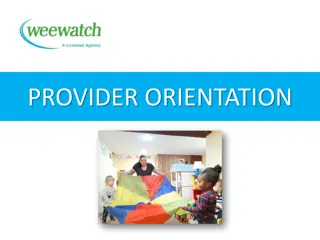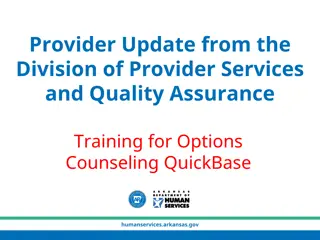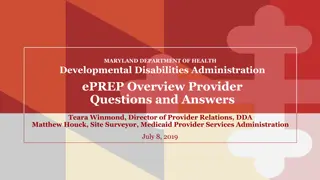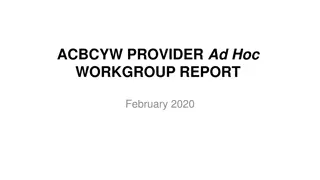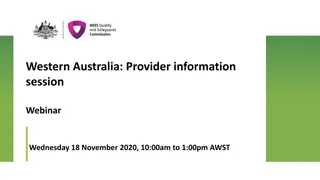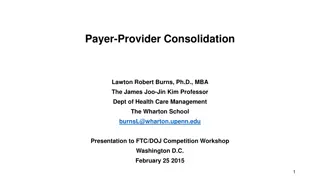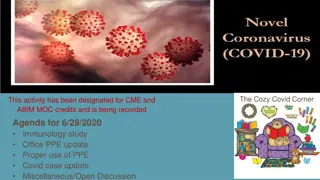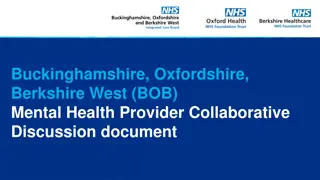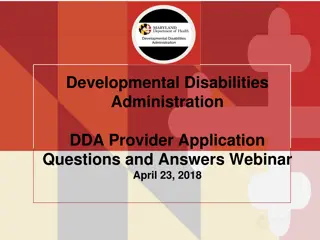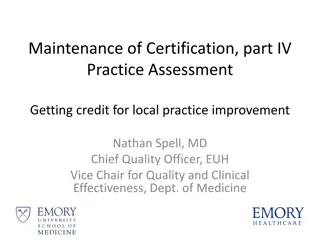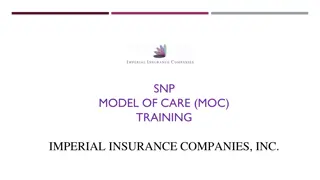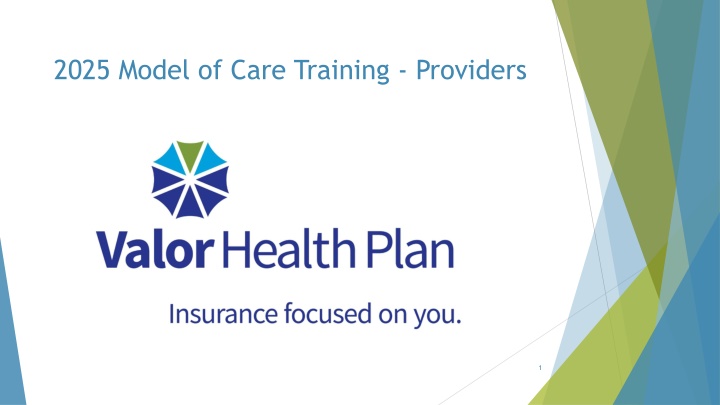
Model of Care Training for Providers 2025 Overview
"Learn about the Model of Care training for Medicare Advantage Special Needs Plans (SNPs) as required by the Centers for Medicare and Medicaid Services (CMS) for Valor Health Plan's I-SNP. Discover the basic components, objectives, and service area population details involved in managing care coordination activities effectively. Gain insights into reducing hospital admissions, maintaining optimal member function, and enhancing quality improvement efforts."
Download Presentation

Please find below an Image/Link to download the presentation.
The content on the website is provided AS IS for your information and personal use only. It may not be sold, licensed, or shared on other websites without obtaining consent from the author. If you encounter any issues during the download, it is possible that the publisher has removed the file from their server.
You are allowed to download the files provided on this website for personal or commercial use, subject to the condition that they are used lawfully. All files are the property of their respective owners.
The content on the website is provided AS IS for your information and personal use only. It may not be sold, licensed, or shared on other websites without obtaining consent from the author.
E N D
Presentation Transcript
Overview The Centers for Medicare and Medicaid Services (CMS) requires all Medicare Advantage Special Needs Plans (SNPs) to have a Model of Care (MOC) and to conduct initial and annual training that reviews the major elements of the MOC for contracted providers and staff. A MOC describes how the SNP will identify and address the needs of enrolled members. This training will review the MOC for Valor Health Plan s Institution- Special Needs Plan (I-SNP). This training is offered to comply with the statutory requirements of CMS that all SNPs provide a general understanding of the requirements of the MOC. 2
Training Objectives The Purpose of this training is to: Describe the basic components of the Valor Health Plan MOC Explain how Valor Health Plan manages care coordination activities for eligible members Describe the essential role providers play in implementing the MOC Review Clinical Practice Guidelines Outline Valor s continuous quality improvement and monitoring efforts 3
Basic Components of the MOC Valor Health Plan s MOC is our detailed, written commitment to CMS on how we will provide care to enrolled members. MOC is designed to: Reduce non-essential hospital admissions when care can safely be provided in the nursing facility Maintain the residents at an optimal level of function Reduce avoidable admissions Increase compliance with appropriate screening/testing/immunizations Increase compliance with clinical practice guidelines Enhance identification and address problems earlier to optimize member function Decrease redundancy and confusion of medical care for this vulnerable population Improve communication 4
Service Area Population Medicare eligible Ohio residents Frail and/or vulnerable 2/3 female Average age over 75 years old Primarily Caucasian Prevalent clinical conditions Additional criteria to identify highly vulnerable/high risk members: Six or more Hierarchical Condition Category (HCC) diagnoses Two or more emergency room visits in past 30 days Two or more inpatient readmissions within 30 days Diabetes Congestive Heart Failure Psychoses Chronic Obstructive Pulmonary Disease Pressure wounds Urinary Tract Infections Falls Incontinence 5
CMS I-SNP Requirements Expected to follow Medicare Advantage program rules, including MA regulations at 42 CFR 422 Must provide Part D prescription drug coverage Focus on: Enrollment Care Coordination Assigned Case Manager and Nurse Practitioner (NP) Completed Health Risk Assessment (HRA) within firs 90 days and then annually thereafter Individualized Care Plan (ICP) completed and shared with all vested parties as requested Interdisciplinary Care Team (ICT) meets as needed to review ICP and member goals and health outcomes PCP-chosen by member or assigned if needed Quality Reduction in hospital visits Reduction in ED utilization Improved overall health outcomes and chronic condition management 6
Care Coordination Staff Structure Case Manager Nurse Practitioner Schedules and completes Health Risk Assessments (HRAs) for new members and annually thereafter Collaborates with Case Manager to create ICP Reviews completed HRA and ICP to determine frequency of rounding on member Creates Care Plan (ICP) collaboratively with NP Communicates HRA and ICP with all vested providers Rounds on members as needed and as determined by risk level Coordinates Interdisciplinary Care Team Meeting (ICT) Participate in ICT 24/7 On-call coverage Assists with Transitional Assessment within 72 hours of discharge from hospital Provide clinical care to promote early diagnosis, intervention, communication, and delivery of services Promotes member engagement through education and encouragement Works collaboratively with other vested providers 7
Additional Provider Requirements Network All contracted providers are credentialed Clinical Practice Guidelines Nationally developed and approved clinical practice guidelines are reviewed every two years, or when there is a significant change Guidelines are available for providers to reference Annual MOC Training Valor Health Plan is required to maintain a comprehensive network of primary care providers and specialists that meet CMS adequacy standards. 8
Clinical Practice Guidelines Please refer to our website for the most current list of our Clinical Practice Guidelines: https://www.valorhealthplan.com/providers/ 9
Communication is key to Collaboration We ask that the PCP or specialist participate in Interdisciplinary Care Team Meetings when available either in person or via phone Valor commits to communicate any transition of care of member, we ask the provider to do the same (open line of communication) Valor s Clinical Team (Case Manager and NP) will communicate any episodic concerns or change in status in a timely manner There will be a NP on call 24/7 365 days a year for any changes in the Member s health status and addressing needs based on that change Members will have access to a local, hands-on clinical team that is integrated in the facility, that will communicate with the member, the PCP, specialist, and family to ensure high quality, continuity of care 10
Quality Measurement and Performance Improvement Measurable goals and health outcomes Evaluation of the Model of Care Data from multiple sources is collected, analyzed, and evaluated on a monthly, quarterly, and annual basis from each Model of Care domain to: Monitor performance Identify areas for improvement Ensure that program goals have been met Continuous quality improvement and monitoring efforts In addition to measurement through claims data, visit encounter data, member surveys and other sources, plans are also asked to implement a Chronic Care Improvement Program (CCIP)-Valor's is focused on heart failure. 11
Attestation Please complete attestation by 12/1/2024 Please go to the following link to attest to receiving and reviewing Valor s 2025 Model of Care Training: https://aproposystems.com/Attestation/Index/H1119 12
Contact Information For more information, please contact: Melissa Smith, Vice President Clinical Operations 7171 Keck Park Cir, NW North Canton, OH 44720 Office (330) 498-8236 Cell (740) 487-6164 13


